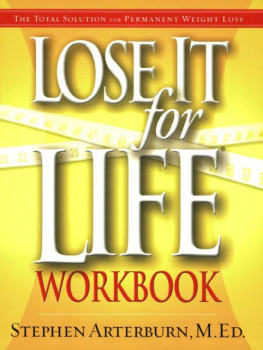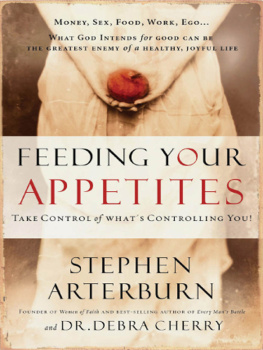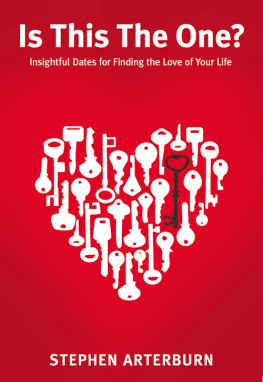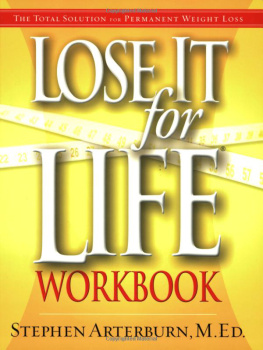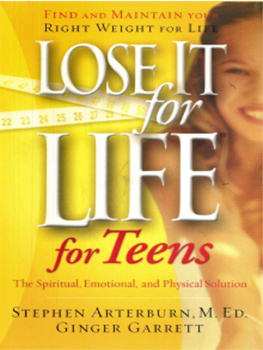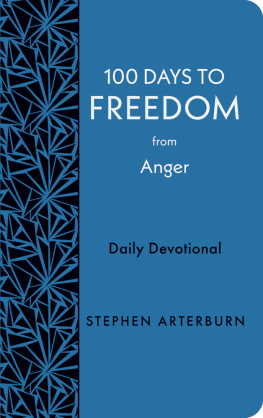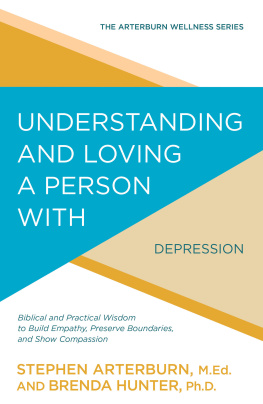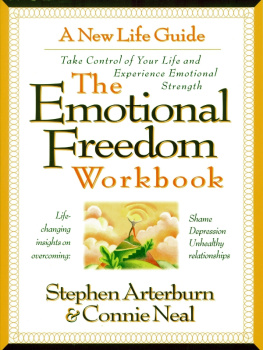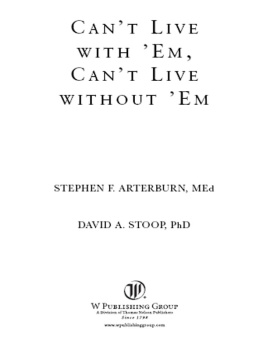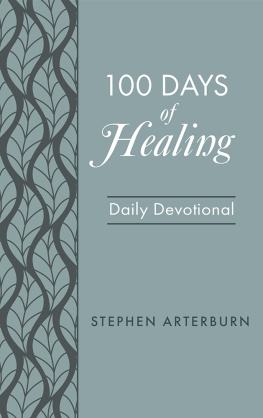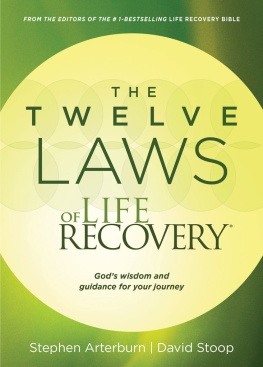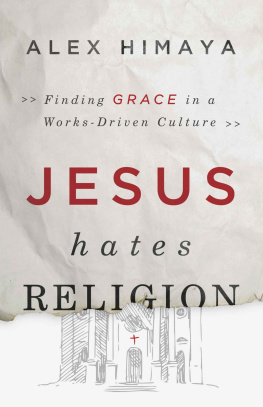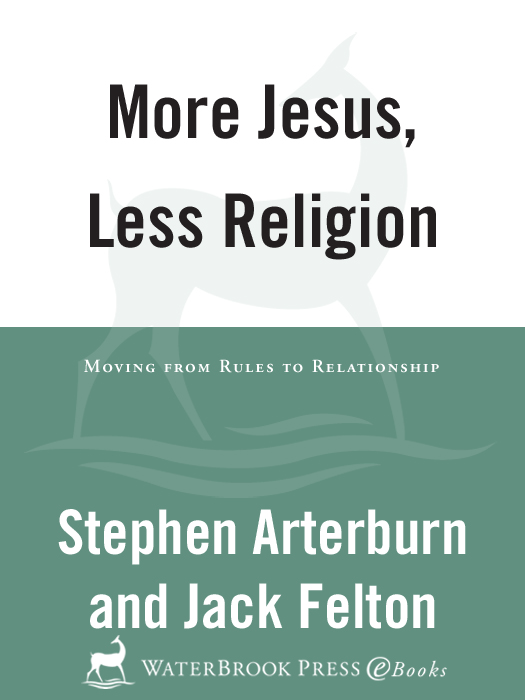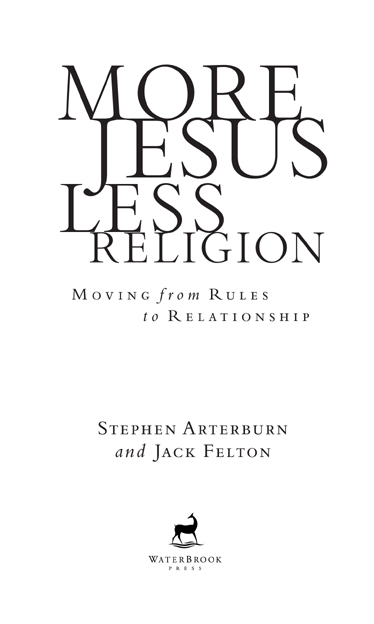M ORE J ESUS , L ESS R ELIGION
P UBLISHED BY W ATER B ROOK P RESS
5446 North Academy Boulevard, Suite 200
Colorado Springs, Colorado 80918
A division of Random House, Inc.
All scripture quotations, unless otherwise indicated, are taken from the Holy Bible, New International Version . NIV. Copyright 1973, 1978, 1984 by International Bible Society. Used by permission of Zondervan Publishing House. All rights reserved. Scripture quotations marked ( TLB ) are taken from The Living Bible copyright 1971. Used by permission of Tyndale House Publishers, Inc., Wheaton, Illinois 60189. Scripture quotations marked ( NASB ) are taken from the New American Standard Bible ( NASB ). Copyright The Lockman Foundation 1960, 1962, 1963, 1968, 1971, 1972, 1973, 1975, 1977, 1995. Scripture quotations marked (AMP) are taken from The Amplified Bible, Old Testament. Copyright 1965, 1987 by The Zondervan Corporation. The Amplified New Testament, copyright 1954, 1958, 1987 by The Lockman Foundation. Also quoted is The New Testament in Modern English, Revised Edition (Phillips) 1972 by J. B. Phillips. All used by permission. All rights reserved. Any italics in Scripture quotes are the authors.
Copyright 2000 by Stephen Arterburn and Jack Felton
Published in association with the literary agency of Alive Communications, Inc., 1465 Kelly Johnson Boulevard, Suite 320, Colorado Springs, Colorado 80920.
All rights reserved. No part of this book may be reproduced or transmitted in any form or by any means, electronic or mechanical, including photocopying and recording, or by any information storage and retrieval system, without permission in writing from the publisher.
W ATER B ROOK and its deer design logo are registered trademarks of WaterBrook Press, a division of Random House, Inc.
Library of Congress Cataloging-in-Publication Data
Arterburn, Stephen, 1953
More Jesus, less religion : moving from rules to relationship / Stephen Arterburn and Jack Felton.1st ed.
p. cm,
eISBN: 978-0-307-45939-8
1. Faith. I. Felton, Jack. II. Title.
BV4637.A685 2000
231.7dc21
99-055258
v3.1
This book is dedicated to Dick Ragsdale.
Rare is the person who has a mentor and encourager
full of wisdom, insight, and godly character.
Dick Ragsdale has been this for me.
Above his business acumen he is a loving husband,
a dedicated father, and an extremely proud grandfather
Thank you, Dick, for all you are
and all you have done for me and my family.
S.A.

This book is dedicated to my son, Jack, the Iceman,
my daughter, Christy,
and my wife, Robin, who keeps us all together.
J.F.
C ONTENTS
1. The Way Things Are
A Healthy Faith Is Based in Reality
2. Just As I Am
A Healthy Faith Is Individualized
3. Ground Zero
A Healthy Faith Is Focused on the True God
4. Handing Over the Keys
A Healthy Faith Is Trusting
5. Called by Name
A Healthy Faith Is Personal
6. Nothing to Prove
A Healthy Faith Is Confident of God-Given Value
7. Passionate Without Apology
A Healthy Faith Is Able to Embrace Human Emotions
8. The Real Deal
A Healthy Faith Is Vulnerable
9. Cut Me Some Slack
A Healthy Faith Is Nondefensive and Nonjudgmental
10. Handle with Care
A Healthy Faith Is Respectful of Others
11. Strong Connections
A Healthy Faith Is Relationship-Oriented
12. Are We There Yet?
A Healthy Faith Is Growing
13. Service with a Smile
A Healthy Faith Is Free to Serve
14. Only One Thing Is Needed
A Healthy Faith Is Contented
15. Sweet Equilibrium
A Healthy Faith Is Balanced
16. The Trademark of Heaven
A Healthy Faith Is Loving
A CKNOWLEDGMENTS
Thanks to Dan Rich, publisher of WaterBrook, who allowed us to provide this follow-up to Toxic Faith. To Laura Barker, managing editor, and the whole WaterBrook team: You are a dream publisher.
Special thanks for the editorial talent of Steve Halliday and Larry Libby. You turned our points of truth into a book of hope.
And sincere gratitude to Greg Johnson, who saw the project through as super agent and friend.
INTRODUCTION

A D IFFERENT W AY OF O PERATING
I have published thirty books in my writing career. Some have been bestsellers; others worst sellers. But of all the projects Ive done, by far the most rewarding has been Toxic Faith (later printed in paperback under the title Faith That Hurts, Faith That Heals).
Just last weekend I was in Orlando among eighteen thousand women at a Women of Faith conference, a movement I was privileged to help create. But the only book of mine I heard anyone mention was Toxic Faith. One woman repeated something Ive heard many times: That book saved my life and my marriage, and it rescued me from a very unhealthy church where I felt trapped.
Im so grateful that God helped me see that not everything about a church that makes us uncomfortable is our problem. Sometimes its the churchs problem. Now, dont get me wrong. I deeply believe in church and I attend a very healthy, strong congregation about which Ill say more later. I believe God is doing a great work today in churches. But many times people never stop to think about whether their church builds them up or tears them down, whether it frees them to enjoy a loving relationship with God through Jesus or whether its hampering and destroying that relationship.
Toxic Faith was primarily about unhealthy beliefs and what we need to do to identify and move beyond toxic faith systems. More Jesus, Less Religion picks up where Toxic Faith left off. In the former book we spent only one chapter, the final one, talking about healthy faith; in this book well spend most of our time describing it.
It has become obvious to me since writing Toxic Faith that the way Jesus did things on this earth was so different from how many of us operate. Often we act in ways to make us feel good about ourselves or to support a tradition weve adopted or to uphold some cherished rule. But Jesus always valued relationships over rules. Whether it was healing a person on the Sabbath or sharing a meal with a known sinner, Jesus acted in unpredictable, unexpected, and life-changing ways. And the fact is, wherever the Master traveled and ministered, two things inevitably happened: Peoples lives were changed and the established religious order was upset.
The most opposition Jesus encountered was not from sinners caught in horrible sins, but from the religious leaders who saw him as a threat to their power, position, and authority. Jesus tended to devalue human systems and rituals because they induced people to lose their first love. Men and women captive to such toxic systems focused on their own power, rather than on the power of God. And when they did think of God, they distorted his image. These people knew God only as a binder of lives, as a vindictive, angry Creator. It took the life and death of Jesus to reposition the image of God in the minds and hearts of desperate men and women. Through Christ they saw Gods compassion, love, and grace.


